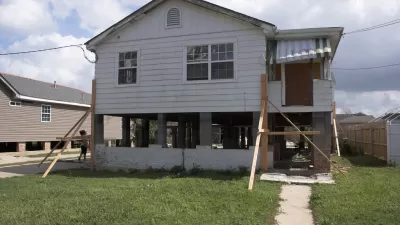CNN reports that a lack of building codes and the construction of vulnerable informal settlements may have contributed to the high death toll in Haiti's earthquake.
CNN quotes Haiti's ambassador Raymond Alcide Joseph as saying that Haiti was a "catastrophe waiting to happen" because of the poor state of the country's infrastructure. The article continues:
"'Among the numerous factors explaining the extent of the loss of lives and goods are the absence of land use zoning and building guidelines, and comprehensive enforcement mechanisms.' Haiti has no national building codes. Port-au-Prince was particularly at risk because it grew rapidly from a population of about 250,000 in the mid-1950s to more than 2 million today, all with little oversight. City planners had [unsuccessfully] called for the surrounding hills to remain undeveloped in order to protect an aquifer....[and] Instead of building concrete structures, they built shanties."
FULL STORY: Haiti was 'catastrophe waiting to happen'

Planetizen Federal Action Tracker
A weekly monitor of how Trump’s orders and actions are impacting planners and planning in America.

Chicago’s Ghost Rails
Just beneath the surface of the modern city lie the remnants of its expansive early 20th-century streetcar system.

San Antonio and Austin are Fusing Into one Massive Megaregion
The region spanning the two central Texas cities is growing fast, posing challenges for local infrastructure and water supplies.

Since Zion's Shuttles Went Electric “The Smog is Gone”
Visitors to Zion National Park can enjoy the canyon via the nation’s first fully electric park shuttle system.

Trump Distributing DOT Safety Funds at 1/10 Rate of Biden
Funds for Safe Streets and other transportation safety and equity programs are being held up by administrative reviews and conflicts with the Trump administration’s priorities.

German Cities Subsidize Taxis for Women Amid Wave of Violence
Free or low-cost taxi rides can help women navigate cities more safely, but critics say the programs don't address the root causes of violence against women.
Urban Design for Planners 1: Software Tools
This six-course series explores essential urban design concepts using open source software and equips planners with the tools they need to participate fully in the urban design process.
Planning for Universal Design
Learn the tools for implementing Universal Design in planning regulations.
planning NEXT
Appalachian Highlands Housing Partners
Mpact (founded as Rail~Volution)
City of Camden Redevelopment Agency
City of Astoria
City of Portland
City of Laramie





























